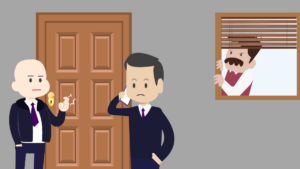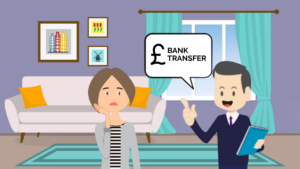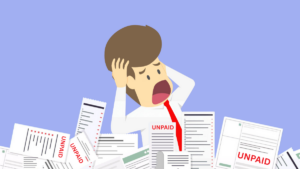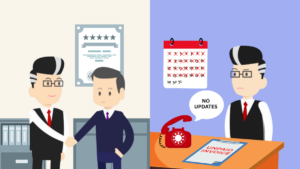Debt collection agencies are a critical part of the financial landscape, especially when individuals or businesses fail to repay their debts. If you have found yourself wondering what a debt collection agency is or how they work, this blog will provide the answers. Whether you are a creditor looking to recover unpaid debts or a debtor facing collection efforts, it’s essential to understand the process and your options.
You may have seen us in action on TV shows like “Call the Bailiffs | Time to Pay Up.” For years, we’ve been guiding clients through these challenging situations, and we’re ready to do the same for you. Claire Sandbrook’s expertise from her time on “Can’t Pay? We’ll Take It Away!“ now shapes her approach on “Call the Bailiffs | Time to Pay Up,” showcasing the evolution of High Court enforcement practices.
Let us dive into how debt collection agencies in London, UK operate, the options available to debtors, and why businesses turn to these agencies for debt recovery.
What is a Debt Collection Agency?
A debt collection agency is a company that recovers unpaid debts on behalf of creditors. Creditors often turn to these agencies when they have exhausted their in-house collection efforts. The agency either works as an intermediary, recovering the debt for the creditor, or purchases the debt at a discounted rate and attempts to recover the full amount.
There are two primary types of debt collection agencies |
- First-Party Debt Collectors | These agencies work directly for the original creditor and act as intermediaries between the creditor and the debtor.
- Third-Party Debt Collectors | These agencies buy the debt from the creditor, usually at a reduced price, and attempt to recover the debt in full for themselves.
How Do Debt Collection Agencies Work?
London debt collection agencies follow a standard process for recovering unpaid debts, which usually looks something like this:
- Initial Contact | The agency will contact the debtor through letters, phone calls, or emails to inform them of the outstanding debt and request payment.
- Negotiation | If the debtor cannot pay the full amount upfront, the agency may offer a repayment plan or a debt settlement. Debt settlement involves paying a portion of the debt in exchange for the remaining balance being forgiven.
- Debt Settlement | This may be an option if it seems unlikely the full amount can be recovered.
- Legal Action | If no agreement can be reached, the agency may take the debtor to court and seek a County Court Judgment (CCJ). A CCJ legally compels the debtor to repay the debt and gives the agency more power to enforce repayment.
- Enforcement | Once a CCJ is issued, the agency may escalate enforcement measures, such as using High Court Enforcement Officers (HCEOs) to recover the debt.
Can a Debt Collection Agency Take You to Court?
Yes, debt collection agencies in London can take you to court if you fail to settle your debt. Once a CCJ is granted, the agency can enforce repayment by seizing assets, garnishing wages, or even involving HCEOs. As seen in “Call the Bailiffs | Time to Pay Up“, these officers have the legal authority to enforce court orders and recover debts on behalf of creditors.
It is crucial to engage with a debt collection agency early on to avoid legal proceedings. If you are unable to pay the full amount, it’s always best to negotiate a repayment plan rather than ignore the agency’s efforts.
How Much Do Debt Collection Agencies Charge?
For creditors, the cost of hiring a debt collection agency depends on the agency’s fee structure, which typically follows one of two models:
- Commission-Based Fees | The agency takes a percentage of the recovered debt, usually between 10% and 50%. The percentage often increases if the debt is older or more difficult to recover.
- Fixed Fees | Some agencies charge a flat fee for their services, regardless of how much debt they recover.
Debtors are typically not charged by the agency unless their original agreement with the creditor includes provisions for passing on collection costs. However, if the case goes to court, the debtor may be responsible for court fees and enforcement costs.
Why Hire a Debt Collection Agency?
If you’re a creditor struggling to recover unpaid debts, hiring a debt collection agency in London can provide several benefits:
- Expertise | Debt collection agencies specialise in recovering debts and have extensive experience in negotiating with debtors.
- Focus on Core Business | By outsourcing debt recovery, businesses can focus on their primary operations, leaving the debt collection to the experts.
- Higher Recovery Rates | Professional debt collectors are skilled in using legal and enforcement methods to recover debts, often with higher success rates than in-house efforts.
- Reduced Conflict | Debt collection can be emotionally charged, particularly in personal relationships or small businesses. Agencies act as intermediaries, reducing the emotional strain and potential conflicts between creditor and debtor.
Debt Collection Agencies in the UK
Debt collection agencies in the UK are regulated by the Financial Conduct Authority (FCA), which ensures they follow strict guidelines. This regulation helps protect debtors from harassment or unfair practices, while also giving creditors peace of mind that their debts are being recovered legally.
Types of debts typically handled by UK debt collection agencies include:
- Unsecured loans
- Credit card debt
- Utility bills
- Overdrafts
- Personal loans
If you are contacted by a debt collection agency in London or elsewhere in the UK, it’s important to know your rights. You can request all communication in writing and ask for proof of the debt before making any payments.
What to Do if a Debt Collection Agency Contacts You?
If a debt collection agency gets in touch, follow these steps |
- Verify the Debt | Ask the agency for proof of the debt. You have the right to see the original contract or agreement that resulted in the debt.
- Check the Statute of Limitations | In the UK, debts can become “statute barred” after six years. This means that while the debt still exists, the agency cannot take legal action to recover it.
- Negotiate a Payment Plan | If the debt is legitimate but you cannot pay the full amount, try to negotiate a repayment plan that fits your budget.
- Seek Professional Advice | If you are unsure about your rights or how to deal with the agency, seek advice from a debt charity or financial advisor. It is essential to understand your options before making any decisions.
Claire Sandbrook and High Court Enforcement
As featured on shows like “Can’t Pay? Take It Away!” and “Call the Bailiffs | Time to Pay Up”, Claire Sandbrook has been a key figure in High Court enforcement for many years. Her experience and leadership have shaped the way enforcement is carried out in the UK today. Whether it is evicting tenants, recovering unpaid debts, or enforcing court orders, Claire’s involvement in these TV shows provides real-world insight into the complexities of High Court Enforcement Officers (HCEOs).
Her role as a High Court Enforcement expert has given her invaluable experience in handling sensitive cases with care and professionalism. If you have seen the show, you know how challenging debt recovery can be – but with the right team on your side, it does not have to be an overwhelming process.
Call to Action
If you need assistance recovering unpaid debts or navigating the legal complexities of debt recovery, contact Shergroup today. With years of experience in debt collection and High Court enforcement, we offer tailored solutions to meet your needs. Visit www.shergroup.com to learn more about how we can help you reclaim what is rightfully yours.
You can reach us |
By Phone | 020 3588 4240
Website | www.shergroup.com and you can chat to us from here
Email | [email protected]
Facebook | Check out Shergroup on this channel and message us
Twitter | Check out ShergroupChat on this channel and message us
LINKEDIN | Check out Shergroup’s LINKEDIN – and please FOLLOW us!
Instagram | Check out ShergroupChatter and
YouTube | Check out Shergroup YouTube Channel – and Subscribe to Our Channel!
Google My Business | https://maps.app.goo.gl/J1pUNBKfFv2SVnjQ6







